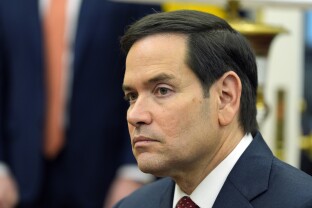Secretary of State Marco Rubio just keeps disappointing his former Senate colleagues.
“I miss the old Marco Rubio,” Sen. Brian Schatz, a Hawaii Democrat and member of the Senate Foreign Relations Committee, told NOTUS on Thursday.
Rubio won unanimous support to join Donald Trump’s cabinet in January, but it’s been anything but smooth sailing for Democrats who openly celebrated his nomination since then. The latest blow to Democrats’ opinions of Rubio came this week, when he ordered diplomats not to comment on whether other countries’ elections were free or fair, and to avoid publicly weighing in on the state of democracy in other countries.
Some senators he used to work with have done their best to convince Rubio to return to his roots, but to no avail. Schatz said he’s spoken with Rubio “maybe a dozen times” since his confirmation in January, and Rubio has been responsive.
“I just sort of tried to remind him that he used to be a hawkish internationalist, and now he sounds like Pete Marocco,” Schatz said, referring to a Trump administration official who has targeted foreign aid for drastic spending cuts.
New Jersey Sen. Cory Booker, a friend of Rubio’s who celebrated his nomination, also slammed the decision to scale back election assessments.
“Every time we step back from advancing democracy, China steps into that void in order to push democracy and our shared values back,” Booker said Thursday. “If people don’t think this is a direct national security issue, they’re mistaken. This is a decision that’s not making a stronger, safer, more prosperous. In fact, it’s doing the opposite.”
Booker told NOTUS he’s also able to get in touch with Rubio since he was confirmed, “and I’m grateful for that.”
“But at the same time,” he said, “I’m very frustrated by what’s going on.”
Others said they don’t recognize their former colleague.
“I’m very puzzled,” said Sen. Tim Kaine, a Virginia Democrat who served alongside Rubio. “I’m really puzzled by things like the incineration of food rather than give it to starving kids.”
“This is a person I worked with for 13 years, but don’t feel like I know him,” Kaine told NOTUS.
Rubio’s confirmation was remarkably easy earlier this year; he moved on to the State Department with unanimous support from his Senate colleagues just hours after Trump’s inauguration.
Rubio often made the case for American involvement abroad while in the Senate: “This is who we’ve been for over two centuries: a people who care,” he said when introducing a Syria human rights bill in 2017. “It’s embedded in our founding principles, in the belief that all people have the right to life and liberty and the pursuit of happiness. Not all Americans. All people.”
As secretary of state, however, Rubio has overseen a definitive step away from American involvement in the world. He led the dismantling of U.S. foreign aid programs, resulting in deaths by starvation and illness among people who had previously relied on that assistance. He’s also overseeing steep cuts to State Department staff.
The new memo about foreign elections, first reported by the Wall Street Journal, instructs diplomats to “avoid opining on the fairness or integrity of an electoral process, its legitimacy, or the democratic values of the country in question.”
Public statements about foreign elections will now only come if “there is a clear and compelling U.S. foreign policy interest to do so,” part of “the administration’s emphasis on national sovereignty.”
American officials have often engaged in foreign election observation in the past, and State Department assessments about interference or meddling by corrupt leaders have assisted foreign pro-democracy activists in seeking changes in their home countries.
“That’s very disappointing,” Sen. Chris Van Hollen, another Democratic member of the Foreign Relations Committee, told NOTUS of the move. “What we’re seeing from Secretary Rubio and the Trump administration is a retreat from democracy promotion, a retreat from human rights enforcement, a retreat from freedom of speech.”
Sen. Andy Kim, a former State Department officer, said he will miss “the role that we could play as a watchdog” in pressing for transparency and democracy around the globe, to the benefit of authoritarian regimes.
Kim also dismissed the argument within the memo that the change will respect other countries’ sovereignty.
“He says that whenever it’s appropriate to him,” Kim argued. “They’re fully engaged in military actions in other countries around the world.”
“I was at the Munich security conference where Vice President Vance berated our partners in Europe,” Kim continued. “Clearly they only make those arguments based off of whenever it feels right for them. And there’s just no consistency.”
Sign in
Log into your free account with your email. Don’t have one?
Check your email for a one-time code.
We sent a 4-digit code to . Enter the pin to confirm your account.
New code will be available in 1:00
Let’s try this again.
We encountered an error with the passcode sent to . Please reenter your email.


